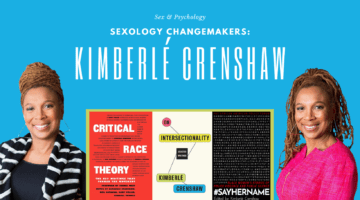Do Men And Women Have Different Sexual Regrets?
December 19, 2012 by Justin Lehmiller
With the New Year approaching, people are starting to talk about their regrets from this past year and some of us are making resolutions to never make the same mistakes again. So what kinds of things do people typically regret? In a national U.S. phone survey in which participants were asked to describe a memorable regret, the most frequently mentioned things people were sorry about doing (or not doing) centered around love, sex, and romance [1]. Common regrets in this area include lost opportunities (i.e., “the one that got away”), past instances of cheating, and the situation surrounding one’s virginity loss. Both men and women report sexual regrets, but do the nature of those regrets differ across the sexes? A new set of studies suggests that they do.
In this research, scientists predicted that male and female sexual regrets would differ for evolutionary reasons [2]. According to evolutionary psychologists, men and women approach sex and relationships very differently because the amount of investment required to produce a child differs dramatically. Because baby-making requires a much greater investment for women than for men, the thought is that women have evolved a preference for reliable guys who are looking to make a longer-term commitment in order to increase the likelihood that men will stick around and help care for any children produced. In contrast, because the investment required by men to make a baby is much smaller, it is thought that guys have evolved a preference for short-term relationships with lots of attractive women to increase the likelihood of producing lots of offspring. Numerous studies have found support for the idea that women are more likely to search for commitment, while men are more likely to look for casual sex.
Given this reasoning, the authors predicted that women would be more likely to regret sexual actions, whereas men would be more likely to regret sexual inactions. In other words, when it comes to sex, women should regret what they have actually done, while men should regret what they did not do, particularly when there are “reproductive fitness” costs associated with the sexual action/inaction. Thus, women should regret instances of casual sex that did not turn into a committed relationship and men should regret spending time in a committed relationship where there was little or no sex because both of these scenarios have theoretical costs (i.e., the women might become pregnant by someone who isn’t going to stick around and the men are losing out on opportunities to pass along their genes).
So what did the researchers find? In Study 1, college student participants were asked to evaluate hypothetical scenarios in which someone took advantage of an opportunity for casual sex that they later regretted or passed on a similar opportunity and regretted it afterward. Participants then rated how much regret they thought they would personally feel in those situations. Consistent with predictions, men reported significantly more anticipated regret for sexual inactions, whereas women reported significantly more regret for sexual actions.
In Study 2, participants recruited online were given a list of common sexual regrets and asked to indicate which ones they had personally experienced. In line with predictions, women indicated more action regrets and men indicated more inaction regrets. It is worth noting that of the 39 sexual action regrets listed, not a single one was more common among men, and of the 30 sexual inaction regrets listed, only one was more common among women. For women, the most common action regrets were (in order): losing one’s virginity to the “wrong” person, cheating on a partner, or jumping into bed “too fast.” For men, the most common inaction regrets were (in order): not telling someone they were attractive, not being sexually adventurous at a young age, and not being more adventurous while they were single.
A third study sought to replicate Study 2 with a much larger sample that included gays, lesbians, and bisexuals. The basic finding that women regretted actions and men regretted inactions emerged again, and this was true regardless of participants’ sexuality. Thus, lesbian, heterosexual, and bisexual women were more likely to regret previous actions, while gay, bisexual, and heterosexual men were more likely to regret previous inactions.
These findings tell us that sexual regrets are a common occurrence for men and women across sexual orientations and that the nature of those regrets differs in line with predictions based on evolutionary theory. Does that mean that evolutionary theory is the “correct” or only way to interpret these findings? No. For instance, perhaps there is a socio-cultural reason for these differences instead of evolved processes. It may be that women feel social pressure to regret sexual actions because there is a societal expectation that women should not have casual sex or enjoy it. Consistent with this idea, across the three studies, men tended to evaluate sexual actions and inactions pretty similarly (i.e., they reported roughly equivalent levels of regret in each case); in contrast, women evaluated the regrets quite differently, indicating very high levels of regret for actions and very low levels of regret for inactions. This pattern of results suggests that women may just be thinking more about the social consequences of their sexual behaviors than men.
Thus, although the results are pretty clear that men and women are sorry for different things in their sexual histories, we can’t say for sure why men and women report different sexual regrets.
Want to learn more about The Psychology of Human Sexuality? Click here for a complete list of articles or like the Facebook page to get articles delivered to your newsfeed.
[1] Morrison, M., Epstude, K., & Roese, N. J. (2012). Life regrets and the need to belong. Social Psychological and Personality Science, 3, 675-681. doi:10.1177/1948550611435137
[2] Galperin, A., Haselton, M. G., Frederick, D. A., Poore, J., von Hippel, W., Buss, D. M., & Gonzaga, G. C. (in press). Sexual regret: Evidence for evolved sex differences. Archives of Sexual Behavior. doi: 10.1007/s10508-012-0019-3
Image Source: 123rf.com
You Might Also Like:

Dr. Justin Lehmiller
Founder & Owner of Sex and PsychologyDr. Justin Lehmiller is a social psychologist and Research Fellow at The Kinsey Institute. He runs the Sex and Psychology blog and podcast and is author of the popular book Tell Me What You Want. Dr. Lehmiller is an award-winning educator, and a prolific researcher who has published more than 50 academic works.
Read full bio >


